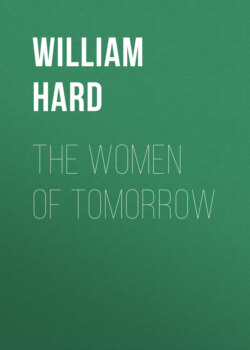Читать книгу The Women of Tomorrow - William Hard - Страница 3
На сайте Литреса книга снята с продажи.
INTRODUCTION
ОглавлениеTable of Contents
The woman of to-morrow will not differ from the woman of yesterday in femininity or physique or capacity, in her charm for men, or her love of children, but in the response of her eternally feminine nature to a changed environment. The environment is bound to alter the superficial characteristics of woman as every change has done. Man, in his turn, will be a beneficiary of this new womanliness as he has been the ready victim of the old-womanishness.
The reader will find in this book a dramatic picture of the gap between girlhood and motherhood which causes both girls and men to go wrong, and which can only be filled adequately by work—work even more suitably performed after marriage than before. Postponed childbearing, if not postponed marriage, is justified by the superiority of the younger children or the children of older parents. A declining birth rate may be redeemed by a declining death rate and the superior progeny of mature marriage.
The life of great-grandmamma fills us with x wonder and pity. Her labors were legion, and, while no longer necessary in the house, their equivalent must be found or girls become parasites. Notwithstanding her incredible labors great-grandmamma died young, having sacrificed herself on the altar of masculine egotism and prerogative. Her life was a short but not a merry one, but our virtuous forefather’s life was a long and sensual one.
To-day woman is beginning to be educated for the new era and man must go with her. She is learning homemaking with new implements and new opportunities. She need no longer be a drudge and she must not continue to be a doll. Since the days of John Ruskin, even the academic economists have had to put spending before saving in the logical exposition of their science,—consumption and thrift can only be adjusted by those who work and live. Hence, the new mother, alert to the larger needs of her household, is more competent than great-grandmamma and must even supplant “the tired business man” in municipal housekeeping, until he can learn to be her equal and himself deserve the suffrage.
xi
Mr. Hard has produced a brilliant volume, as might have been expected. Mr. Hard could write a book in the dark; but it may not have been known that he could illumine with such scholarly sagacity the shadows cast on the woman question by man’s huge egotism and woman’s carefully coddled superstition. Originally magazine articles, Mr. Hard’s chapters are a unit in being sound economics and sociology on the woman question, but they will probably not secure him a doctor’s degree from his alma mater for they are also humorous, intelligible and inspiring.
Charles Zueblin.
3
